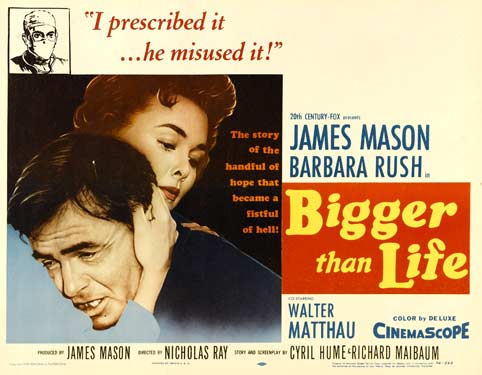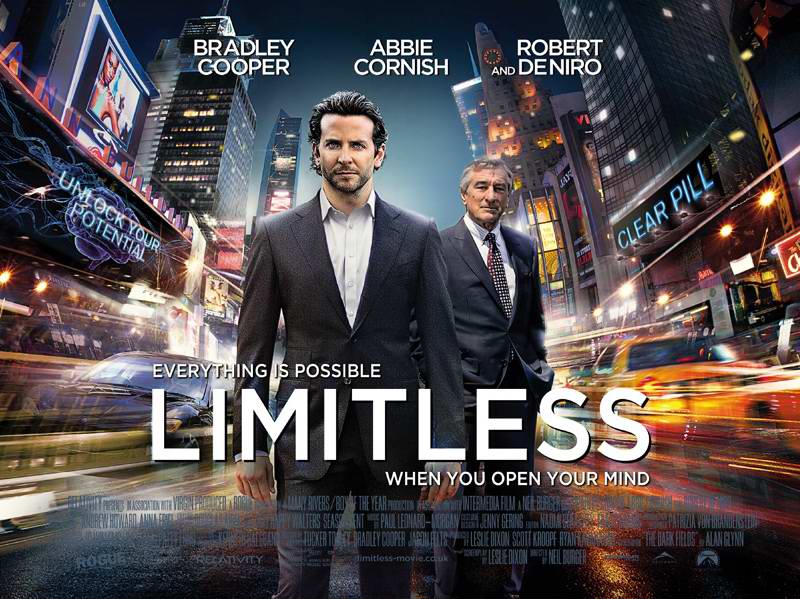|
One of the students at my recent Writing Science Fiction workshop asked, "what is the definition of Science Fiction?" It’s a good question. A vast range of stories comes under this genre heading. Stories about aliens and robots. Post-apocalyptic stories and pre-apocalyptic stories. Time-travel stories, and ones that take place in alternative histories. Stories about the far future, and stories about the distant past. Epic “space operas” and small chamber pieces. Science Fiction covers a huge amount of ground - and not all of it has that much to do with science. So how do so many diverse themes fit into a single genre? One way to answer the question is to look at two films with similar themes and see what makes one Science Fiction, and the other … something else. In BIGGER THAN LIFE (Nicholas Ray, 1958), schoolteacher Ed Avery is prescribed cortisone for a heart condition. The drug has an unexpected side-effect: he becomes suffused with a sense of personal power, megalomaniacally convinced that he has “a special plan for this world,” which he retails to a mixed response at his school’s PTA evening. Later, feeling displeased with his son, Ed decides that he must deal with him in the manner of the biblical Abraham, who was ordered by God to sacrifice his own son, Isaac. Ed’s terrified wife reminds him that the Bible story was in the nature of a test: on seeing Abraham’s obedience, God relented and sent an angel to tell the faithful father to spare Isaac. Ed answers his wife with the memorable line, “God was wrong.” But the effects of the drug never really transcend Ed’s family and immediate surroundings, and we don’t feel that his estimation of his mental powers and leadership potential is accurate. It seems, instead, that he is horribly deluded. So Bigger Than Life remains a Social or Medical Drama – maybe a Psychodrama – rather than a Science Fiction story. Let’s compare LIMITLESS (Neil Burger, 2011). When struggling writer Eddie Morra begins to take a smart drug, his intelligence actually is elevated. He can write long screeds of quality prose without effort; he has instant, detailed access to all his memories, no matter how fleeting or partial; his perceptions become extremely acute; and he can quickly synthesise all these elements into expert knowledge on virtually any subject, enabling him to earn a fortune as a Wall Street trader - evidently the fastest route he can envisage to complete financial independence. In other words, the changes that the drug has made in Eddie are tested against a wider world – and found to be real.
Later in the film, Eddie must contend with another man who is also taking the smart drug, and is using his increased capacity to the more sinister ends of masterminding a violent criminal empire. This is a strong sign that the drug is indeed effective, and that it can be put to a wide variety of applications. It’s possible to imagine a scenario in which the central conceit of Limitless is taken a step further, and just about everyone in a given society – or the world at large - has their intelligence and effectiveness raised by the drug. What would a planet full of individual geniuses, all pursuing their possibly conflicting ends, look like? That’s a question for another day, but Eddie and Ed’s experience suggests a possible working definition of Science Fiction: “A story with a novel (but plausible) twist on reality at its heart which has the potential to ripple out and affect the entire world in which the story is set.” Maybe you can come up with a much better definition? Feel free to add your thoughts. I’ll be holding the Writing Science Fiction workshop again in the not-too-distant future – do get in touch if you would like to know more. Blog post written by Ian Long.
9 Comments
6/10/2015 05:14:17 pm
Very interesting article. I didn't know the Nick Ray movie, must check it out. I like your distinction. However might this not also include Harry Potter?!!
Reply
Veronica Haidar
7/10/2015 02:05:00 pm
Interesting article; there have been some great recent examples of sci-fi films. Some argue that sci-fi is really a setting, or a world, rather than a genre. However for me, the thing that defines the best sci-fi films is that they examine aspects of what it means to be human from an external perspective. For example, Bladerunner examines how our memories define who we are from the perspective of replicants that have no genuine memories of their own. Similarly, Under the Skin examines our human need to reach out to each other and connect even in the most extreme circumstances from the perspective of an alien who has no such feelings.
Reply
Parkino
7/10/2015 05:02:26 pm
Nice comparison.
Reply
Ian
7/10/2015 07:05:38 pm
Thanks for your comments. I think it's true that Science Fiction can be seen as an 'intensifier' of other genres, Veronica, rather than a genre in its own right - but it's interesting to work out just how this intensification works. Your idea of examining humanness from an external perspective is good.
Reply
Ian
10/10/2015 11:11:17 pm
And Transcendence takes the "single elevated consciousness" theme a step further, with its vision of a human mind rendered omniscient by being uploaded into a computer and connecting with the internet...
Reply
Ian
11/10/2015 06:09:03 pm
One interesting question raised (but not satisfactorily answered) in Transcendence is whether a mind uploaded in this way can retain its 'personhood' - opening up thoughts about the embodied nature of human consciousness.
Reply
23/10/2015 11:28:57 am
Hi Ian
Reply
Enrico Mughetti
25/10/2015 12:39:21 pm
Hi Ian
Reply
Elly Stanton
29/10/2015 11:57:20 pm
As science fiction is a relatively new genre (when it started depends on what you count as belonging to it; how about Frankenstein written in 1830?) it could be difficult to predict where it is going. To make things more complicated it depends on developments in science and we don't know where they will be going so predictions start to look futile. I feel that 20,000 leagues under the sea is more of a thriller with someone hiding out in a sea monster (that makes Goldfinger look conventional) due to a personal grievance with most of the world. The biggest 3 names in 20th century science fiction wrote about space travel as it was the Next Big Thing. For Clarke Asimov and Heinlein it really was Space, Space and Space until the world seemed to lose interest, presumably because someone worked out the cost of a manned trip outside the solar system and the advent of hormonal contraception scaled back the wildest projections of Planet Earth's final population. It all seemed to be about how great modern science and technology were and how we would use them literally to conquer the universe in that unself-conscious manner humanity has had for so long.
Reply
Leave a Reply. |
BLOGTHE ONLY PLACE TO TALK ABOUT THE CRAFT OF SCRIPTWRITING. Archives
November 2023
|
Privacy Policy © Euroscript Limited 2020




 RSS Feed
RSS Feed


